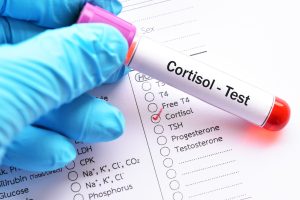 Cushing syndrome is a hormonal disorder that occurs when the body produces too much cortisol (the stress hormone) over an extended period. The disorder may also develop as a result of taking medications such as glucocorticoids.
Cushing syndrome is a hormonal disorder that occurs when the body produces too much cortisol (the stress hormone) over an extended period. The disorder may also develop as a result of taking medications such as glucocorticoids.
Cortisol, when produced within normal levels helps the body to suppress inflammation, metabolize food into energy, regulate the stress response, control the sleep/wake cycle, and regulate blood pressure and blood glucose. However, too much cortisol can cause the following symptoms to develop:
- The formation of a fatty lump between the shoulders
- Weight gain in the face
- Weight gain in the trunk
- Thin arms and legs
- Pink or purple stretch marks mostly on the abdomen, hips, underarms, and breasts
- Acne
- Skin that bruises easily
- Hirsutism
- Irregular periods
- Infections
- Muscle weakness
- Erectile dysfunction
- Reduced fertility in men
- Slowed or delayed growth in children
Some people are more likely to develop Cushing syndrome than others. A person may have a higher risk if they are taking high-dose corticosteroids over some time, living with adrenal or pituitary tumors, assigned female at birth, or have a family history of certain genetic disorders.
Cushing syndrome can be difficult to diagnose because the symptoms often have other causes. However, a physician such as an endocrinologist can perform a physical exam, review your medical history, and order a series of tests to measure cortisol levels or look for tumors to determine a diagnosis.
It is crucial to receive timely treatment for Cushing syndrome, delayed treatment can lead to the following complications:
- Diabetes
- Depression
- Heart disease
- Stroke
- Heart attack
- Osteoporosis
- Hypertension
Treatment focuses on lowering cortisol levels in the body. This may be achieved through medications, surgery, radiation therapy, or lowering the dose of glucocorticoids.
To schedule an appointment with an endocrinologist at Flushing Hospital Medical Center, please call 718-670-5486.
All content of this newsletter is intended for general information purposes only and is not intended or implied to be a substitute for professional medical advice, diagnosis or treatment. Please consult a medical professional before adopting any of the suggestions on this page. You must never disregard professional medical advice or delay seeking medical treatment based upon any content of this newsletter. PROMPTLY CONSULT YOUR PHYSICIAN OR CALL 911 IF YOU BELIEVE YOU HAVE A MEDICAL EMERGENCY.
